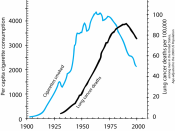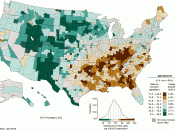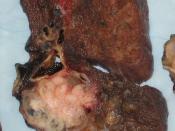Health Research Paper
Lung Cancer is the uncontrolled growth of abnormal cells in the lungs. Lung cancer often spreads through the bloodstream or lymphatic system to other tissues. There are about 157,000 people that die from lung cancer each year. There are four types of lung cancer, which are likely to come up in different parts of the lung. Each type differs in behavior and characteristics. Adenocarcinomas, Squamous cell carcinoma, Small-cell carcinoma, and large-cell carcinomas are the types of lung cancer. Adenocarcinomas is a lung cancer that is created on the outer ends of the lungs and under the inside layer of the bronchial tubes. Squamous cell carcinoma is a lung cancer that begins toward the central part of the lung in the bronchial tubes. Small cell carcinoma is a lung cancer that spreads more quickly and it is characterized by small cells. Large cell carcinoma is a lung cancer that begins along the outer edges of the lung and it is characterized by large abnormal cells.
There are different effects on lung cancer.
Scientists and researcher have concluded that aspirin may reduce the danger of developing lung cancer. It is also reported that smoking tobacco is the biggest risk factor in developing lung cancer. The number of people of lung cancer was decrease with the people that took aspirin. Regular aspirin use may help to prevent lung cancer. To test the effect of aspirin on the risk of developing lung cancer, out 14,275 women living in New York State, eighty-one women with lung cancer had said that that they used aspirin. These women had same characteristics, but did not have lung cancer. The only problem is that aspirin use may be inexact, as women couldn't remember how often they had used aspirin in a period of half a year.


